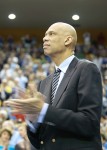Athletic achievements can build a legacy. The number of wins and the total championships are often what the common fan remembers.
But what cements that legacy and what history remembers most – more than an athlete’s win-loss record – is a player’s impact and voice away from the game.
That starts with political activism.
Politics and sports have been intertwined for centuries, each fueling the other to bring about change and progress.
UCLA baseball alumnus Jackie Robinson broke racial barriers as the first African-American to play in the MLB in 1947, while fellow Bruin Lew Alcindor has dedicated his post-basketball career to tackling social activism.
Alcindor, who changed his name to Kareem Abdul-Jabbar after converting to Islam, often writes as a columnist for Time magazine, speaking out against bigotry and racism.
But it was San Francisco quarterback Colin Kaepernick who brought that voice back to the forefront in 2016 with his stand for the Black Lives Matter movement.
Kaepernick knelt as the national anthem played before football games in protest of police brutality against African-Americans.
He later told reporters that he received death threats for his stance.
The reactions on social media were also harsh – many called for boycotts of his games and others questioned his patriotism.
Few will remember how dismally the 49ers performed, winning just two games in 2016. But Kaepernick’s choices and actions have defined this season for him.
Critics who say he should focus on sports instead of muddling himself in social causes are wrong. Athletes offer some of the best perspectives on political issues and they should not be silenced.
[Claire-ification: Collegiate athletes’ freedom of speech should not be stifled]
Few have access to the global platforms that athletes do – the Olympics and the World Cup are the most watched events – to enact change.
They should take advantage of those opportunities not just for themselves but for their country or the causes they believe in.
On Friday, a new president will be inaugurated – one that is incredibly polarizing and has left fear in his wake. For many, Jan. 20 will herald in four years brimming with uncertainty and filled with calls for change.
No matter where they fall on the political spectrum, now more than ever, people’s opinions – whether they are those of athletes, celebrities, politicians or college students – matter.
History has reached a crossroads once again.
It did when rugby unions refused to compete in South Africa in a stand against apartheid.
It did again when the NCAA, NBA and other professional organizations pulled their athletic events from South Carolina in protest of the Confederate flag and then from North Carolina because of the “bathroom law.”
Every voice matters and athletes have the right to make theirs heard.
